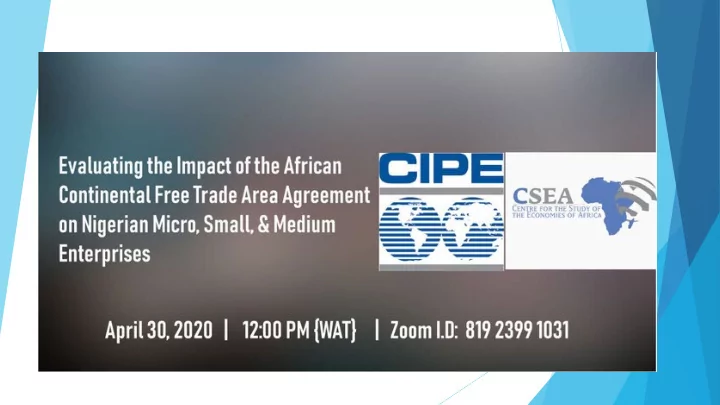

Study Background and Presentation of Survey Design
Outline 01 Study Background 02 Objective of the study/survey 03 Sampling Design A Note on the Survey Instrument 04
Background to the Study u Economic integration and agreement are widespread: A transition of countries from nation-states to member states.
Stages of economic integration in Africa The creation of a continental customs union 4 Consecutive establishment of free trade areas and customs unions in each bloc 3 Strengthening of intra-regional integration and the harmonization of tariffs between the blocs 1997-2007 2 Creation of Regional blocs (Regional Economic 1 Communities) 1994-1999; AMU, COMESA, ECOWAS, ECCAS, SADC, IGAD, CEN-SAD, EAC
ECOWAS Experience in Economic Integration
Drivers of Economic Integration u Trade creation u It reduces economic fragmentation u Pan-Africanism u Availability of cheaper and quality products and expanded choice-sets for consumers. u Efficiency gain and higher profit from access to foreign competition and cheaper inputs. u Greater ease of doing business and more foreign investment.
The Other Side of Economic Integration u Trade diversion u It exposes vulnerabilities of some domestic firms in the short run. u Adjustment costs
The African Continental Free Trade Area (AfCFTA) u The new Africa Continental Free Trade Agreement (AfCFTA) endorsed by 54 African countries (including Nigeria) in July 2019 will likely have widely varying effects on businesses within and across participating countries. u For Nigeria, the impact of AfCFTA as with any other FTA could vary on account of a number of market opportunities and constraints to production. u This study will examine the likely impact, threats and opportunities, of AfCFTA on MSMEs in Nigeria. u The voice of MSMEs is still silent in the discussion on AfCFTA in Nigeria and T HIS HAS IMPLICATIONS . We hope to generate evidence to amplify their voices.
u Evaluate MSMEs understanding of the AFCFTA policies in terms areas of comparative advantages and What we hope to disadvantages achieve with the u Gauge MSMEs capacity to meet process requirements of the AFCFTA: this will access the ability of MSMEs to survey? meet current standards and process requirements on exports to AFCFTA partners. u Gauge MSMEs competitive, technical and productive capacities.
Stylized fact on MSMEs in Nigeria variable Summary Total Enterprises Number – MSMEs 41,543,028 MSMEs Contribution to Employment 76.5 percent of total workforce (or 59,647,954 persons) MSMEs Contribution to GDP 49.78 percent MSMEs Contribution to Export 7.64 percent - Micro Enterprise Class 41, 469,947 (or 99.8 percent) - Small Enterprises Class 71,288 (or 0.2 percent) - Medium Enterprises Class 1,793 (or 0.004 percent) Largest Economic Sectors Wholesale/Retail Trade 42.3 percent Agriculture 20.9 percent Other services 13.1 percent Manufacturing 9.0 percent Accommodation and Food Services 5.7 percent
Sampling Approach Location u Lagos u Kano u Abia u Abuja Why? We select sectors with high potential and contribution to GDP , Sector employment and Wholesale/Retail Trade exports. Agricultural sector and food processing Manufacturing sectors.
Three Stage Sampling procedure u Purposive sampling of states: We select the location to reflect geopolitical spread and high share of MSMEs in the selected states. u Purposive sampling of sector: The selected sectors account for 77% of the MSMEs in Nigeria. Excluding crude oil and petroleum, they also have a considerable share of exports. u Random Sampling of firms: We will selected three largest markets in each state and randomly pick a location from which firm will be systematically selected for the study. u Overall, we propose to survey 1600 firms across the four locations.
Selection of sectors and states Table 3: Abia State Table 4: Abuja (FCT) Sectors Micro Small Medium Total Sectors Micro Small Medium Total Enterprises Enterprises Enterprises Sample Enterprises Enterprises Enterprises Sample Sample Sample Sample size Sample Sample Sample size Wholesale/ 25 70 9 Wholesale/ 25 50 5 Retail Retail Trade Trade Agriculture 25 50 5 Agriculture 25 55 7 Manufactur 25 50 5 Manufactur 25 40 7 ing ing Food 25 50 5 Food 25 55 7 Services Services Total 100 200 20 320 Total 100 220 30 350
Selection of sectors and states Table 5: Kano State Table 6: Lagos State Sectors Micro Small Medium Total Sectors Micro Small Medium Total Enterprises Enterprises Enterprises Sample Enterprises Enterprises Enterprises Sample Sample Sample Sample size Sample Sample Sample size Wholesale/ 25 50 15 Wholesale/ 25 100 25 Retail Retail Trade Trade Agriculture 25 50 25 Agriculture 25 50 10 Manufactur 25 100 25 Manufactur 25 50 15 ing ing Food 25 50 25 Food 25 50 10 Services Services Total 100 300 100 500 Total 100 200 50 350
The Survey Instrument u SECTION A: BASIC BUSINESS INFORMATION u SECTION B: INTERNATIONAL BUSINESS OPERATIONS u SECTION C: EXPORT AND IMPORT OPERATIONS u SECTION D: AWARENESS AND PERCEPTION ABOUT AfCFTA u SECTION E: GAUGING MSMES COMPETITIVE CAPACITY AND CAPACITY TO MEET PROCESS REQUIREMENTS OF THE AFCFTA
Recommend
More recommend